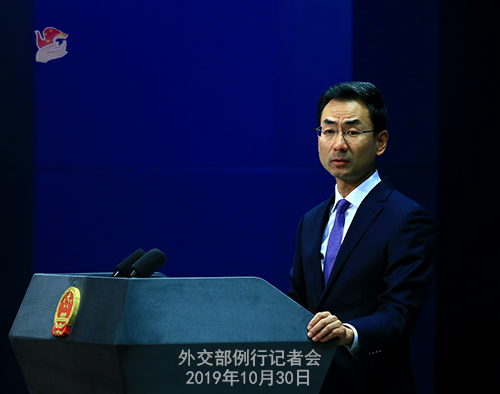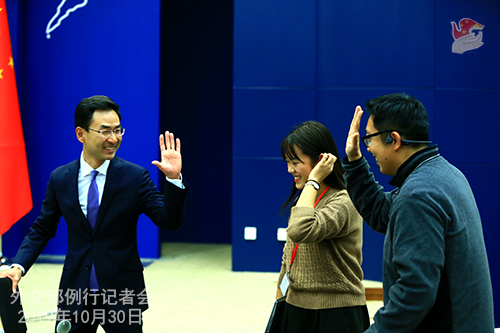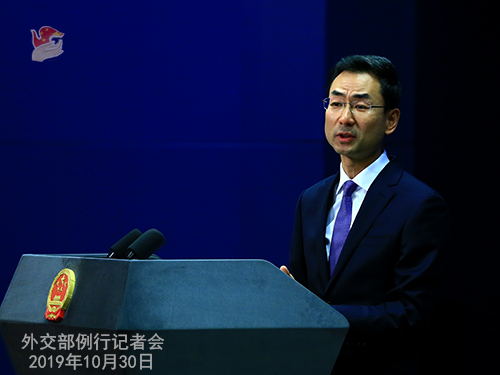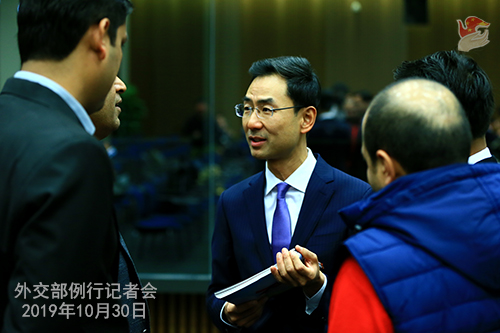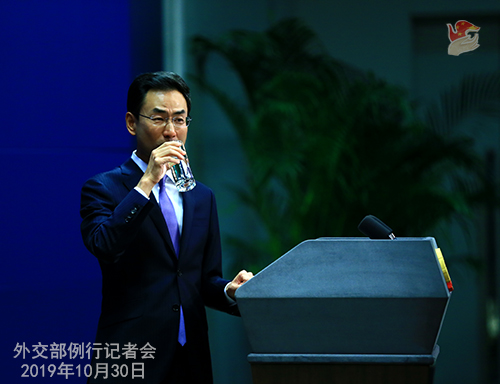| Foreign Ministry Spokesperson Geng Shuang's Regular Press Conference on October 30, 2019 |
| 2019-10-30 19:50 |
|
At the invitation of the governments of the Republic of Madagascar, the Republic of Namibia, and the Republic of Ghana, Vice Premier Sun Chunlan of the State Council will pay official, friendly visits to the three countries from November 4 to 13. Q: A senior US administration official says that the phase one of the China-US trade deal may not be completed in time for signing when the two heads of state meet in Chile next month as expected. However, this does not mean the trade deal is falling apart. Does China expect the phase one of the trade deal to be signed during the APEC summit in Chile? A: Regarding the specifics and progress in the trade consultations, I would refer you to the competent authority. I will reiterate our principled position on the economic and trade issues between China and the US. The two sides made substantial progress in some of the consultations towards an agreement in the recently-concluded 13th round of talks. On October 25, the heads of the two teams agreed in a telephone call to properly address each other's core concerns and affirmed that technical consultations on part of the text has been basically completed. They will have another telephone call shortly. In the meantime, working-level consultations will be continued at a fast pace. It is China's hope that the two sides can find a way to resolve the economic and trade issues on the basis of mutual respect, equality and mutual benefit. Q: According to data from the OECD, global FDI flows fell by a fifth in the first six months of 2019 compared with the second half of the previous year. FDI flows into the US dropped by more than a quarter. By contrast, flows to China increased by 5 percent. Do you have any comment? A: I noted these statistics released by the OECD, which I believe speak volumes about some facts. First, the fall of FDI in the first half of this year further testifies to the worsening of global investment environment. The biggest factor leading to this situation is protectionism and unilateralism. Second, FDI flows into the US dropped dramatically while flows to China increased. It cannot be more obvious who is becoming more open and who is becoming more conservative. In a few days, the second China International Import Expo (CIIE) will be held in Shanghai. So far 63 countries have registered for country exhibition and over 3,000 businesses from more than 150 countries and regions will be attending business exhibition. It is worth mentioning that 192 American businesses will attend the exhibitions, an 18 percent increase compared to last year, with a total exhibition area of about 47,500 square meters, the biggest among all participating countries. This again shows that businesses from around the globe, including American ones, are optimistic about China's economic prospects and market potential. They are ready to continue investing in China and deepening cooperation with China. Perhaps we should ask those American exhibitors whether they would like to leave China or see a "decoupling" of the two countries? I shall reiterate that China's pace of reform will only become faster and the door will only open wider. We call on the international community to join hands against unilateralism and protectionism, provide a fairer, more just and predictable business environment for investors, create more development opportunities, promote global trade and investment liberalization and facilitation, and foster an open world economy.
Q: According to media reports, Argentina's Permanent Representative to International Organizations in Vienna Rafael Grossi was elected Director General of the International Atomic Energy Agency (IAEA) on October 29. What's your comment? A: China congratulates Argentina's Permanent Representative to International Organizations in Vienna Ambassador Grossi on his election as Director General of the IAEA. The IAEA is the most universal and authoritative inter-governmental organization in the nuclear field. It plays such important roles as promoting the peaceful use of nuclear energy and preventing proliferation of nuclear weapons. China hopes that Ambassador Grossi will lead the organization in fulfilling its functions in an objective, impartial and professional spirit to better deal with challenges to global security and development. China stands ready to further deepen practical cooperation with the IAEA to jointly contribute to world peace, security and sustainable development. Q: Former Australian ambassador to China Geoff Raby said in an article published recently in the Australian Financial Review that the "China threat" narrative dominating China policy in Australia's security and intelligence system has effectively frozen bilateral relations and led to ill-advised decision-making on issues regarding China, which is seen by the Australian side as a badge of honor. He said that megaphone diplomacy will only harm Australia's national interests and declared "it is time for diplomats to be put back in charge of our foreign policy on China". I wonder if you have a comment? A: We have taken note of relevant reports. For some time, people of vision in Australia, proceeding from the interests of Australia and Australians, have reflected upon the country's China policy and put forward suggestions on how to improve relations with China. The Australian government should heed these objective and rational voices. It is China's consistent belief that a sound and stable China-Australia relationship serves the fundamental interests of both peoples. We hope the Australian side will learn from the setbacks in our relations in recent years, look at China and China-Australia relations in an objective, rational and just manner, adhere to the principle of mutual respect and equality, and take concrete measures to enhance mutual trust, expand cooperation and manage differences to ensure the sound and steady development of bilateral relations. Q: Last night, Australian Foreign Minister Payne made some quite strong comments about China, saying that Australia will continue to speak out about human rights issues in China. Is China opposed or upset at what she said last night on China? A: We note that the Australian Foreign Minister spoke positively about China's development and China-Australia relations and expressed readiness to develop comprehensive strategic partnership with China and to properly manage differences. We appreciate that. However, on the same occasion, she also made an issue of Xinjiang to serve political purposes in total disregard of facts. Such ill-advised remarks will not help to improve or grow relations with China. We have lodged stern representations to the Australian side and pointed out the inappropriate nature of her conduct. We have repeatedly stated that a sound and stable China-Australia relationship serves the fundamental interests of both peoples. We hope the Australian side will reflect upon and learn from recent setbacks in our relations and meet China halfway rather than take one step forward and two steps backward. Besides, the Australian government should really give some thought to the views in the article mentioned in the previous question.
Q: The US, the UK and some other countries criticized China's Xinjiang policy at the UNGA Third Committee session on the Committee on the Elimination of Racial Discrimination (CERD). We noted that many developing countries delivered a joint statement in support of China's stance on Xinjiang and against the remarks by those Western countries. What's your comment? A: At the Third Committee session on the CERD of the 74th UNGA on October 29, the US and the UK, among a handful of Western countries, attacked and slandered China on Xinjiang-related issues. More than 60 countries attending the session spoke in support of China's position on Xinjiang, commending China's tremendous human rights progress and Xinjiang policy, and expressing opposition to interference in China's domestic affairs under the pretext of human rights. The few Western countries' anti-China show ended as a disgraceful debacle. The Xinjiang Uyghur Autonomous Region has taken a series of counter-terrorism and de-radicalization measures according to law, including the establishment of vocational education and training centers. These measures have turned the security situation around. There was not a single violent, terrorist incident in Xinjiang in the past three years. The region now enjoys social stability and unity among all ethnic groups. People there are living a happy life with a much stronger sense of fulfillment and security. Their rights to life, health and development have also been significantly improved. Just as dozens of countries pointed out in their remarks and joint statement, the measures in Xinjiang have effectively safeguarded the basic human rights of people of all ethnic groups and maintained security and stability there. We urge the US, the UK and some other countries to stop confusing right and wrong in disregard of facts. In March this year, the Council of Foreign Ministers of the Organization of Islamic Cooperation adopted a resolution which commended China's efforts "in providing care to its Muslim citizens". In July, ambassadors of over 50 countries to the UN Office at Geneva co-signed a letter to the president of the UN Human Rights Council and the High Commissioner for Human Rights, applauding China's respect and protection of human rights in its counter-terrorism and de-radicalization efforts. This time, over 60 countries spoke in support of China, expressing an overwhelming voice of justice, which stood in stark contrast with a few countries' misrepresentation of facts and groundless accusations. This has shown clearly where international support lies and demonstrated that futile attempts to smear China win no hearts. As is known to all, the human rights records of the US, the UK and some other countries are nothing to be proud of. Those countries are in no position at all to criticize others. What they need is a proper self-reflection. We advise them to take off the mask of "human rights guardians", stop politicizing the human rights issue and applying double standards, and stop interfering in others' domestic affairs under the cover of human rights. They should grasp the situation, go with the trend, and make tangible contributions to the healthy development of the global human rights cause. Q: A New York-based orchestra canceled its planned tour to China because its three ROK musicians had been denied visas allegedly due to the THAAD issue in 2016. What's your comment? A: I'm not aware of the situation you mentioned, but I believe it is an isolated visa case. I want to share some data with you. In 2018, about 9.5 million visits were made between China and the ROK. Specifically, people from the ROK made 4.193 million visits to China. If China refuses to issue visas due to the THAAD issue as some claim, how could those several million people have made it to China?
Q: After the Third Committee session on the CERD, the British, US and German ambassadors to the UN attended a press conference, during which the German ambassador said it is urgent to ensure unrestricted visits to Xinjiang and all vocational education and training centers by the United Nations High Commissioner for Human Rights, and he couldn't understand why China should oppose such visits. How do you respond to that? A: I just stated China's position very thoroughly and I'm not going to repeat that. Regarding the visits to Xinjiang you talked about, like we stressed repeatedly, we've invited diplomats, journalists and religious personnel from many countries to visit Xinjiang. After the visits, they said what they saw and heard there was totally different from what the Western media and countries claim. In fact, China also extended invitations to the High Commissioner many times and has been in touch with the UN. The US and the UK, among others, on the one hand, say that China should allow UN officials to visit Xinjiang, while on the other hand pressuring and harassing those who do so. This is highly inappropriate and reveals their hidden political agenda. Xinjiang is an open region. We welcome journalists and diplomats to visit there and hope they will get to know the real situation in Xinjiang. Of course, the visits should be made in accordance with Chinese laws after making full communication with the Chinese side and going through necessary procedures at times. Q: Do you have any more information on the intra-Afghan talks in Beijing? Are you able to tell us when they will take place? A: I answered this very question from you yesterday, right? My answer remains the same. Would you like me to repeat it? We will keep you updated if there is any information. Q: According to media reports, a Chinese military aircraft entered the ROK's air defense identification zone yesterday, the 25th time Chinese military aircraft have done so. Why is this? The difference this time is that the Chinese aircraft responded with flight information prior to entering the ROK's air defense identification zone. What is the reason and background for doing so? A: I would like to point out that air defense identification zones are not territorial airspace. As to the activities of the Chinese military aircraft, I would refer you to the Ministry of National Defense, who will be holding a press conference tomorrow.
|
 |
|
